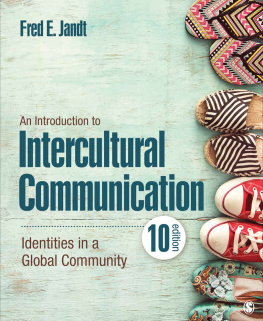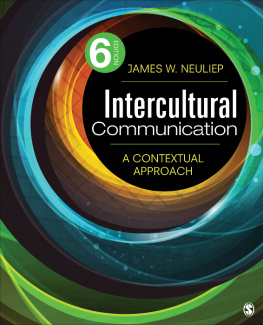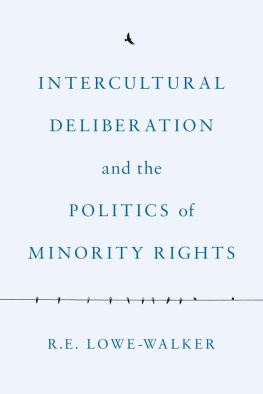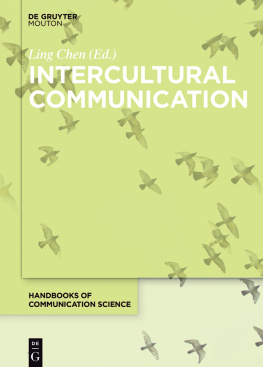The Intercultural Mind Praise
The Intercultural Mind is a nascent exploration of the interrelationship between cultural neuroscience and intercultural competence. It provides an accessible and intelligent introduction to the potential blend of these two areas. Joseph Shaules rich international experience and scholarly exploration allows both seasoned and novice professionals an entry point into this topic, which will surely be influential in the future of the field.
Janet Marie Bennett, Executive Director, Intercultural Communication Institute
The Intercultural Mind is an invitation to travel mentally and physically. Joseph Shaules is a knowing guide and a shrewd teacher who makes some difficult concepts come alive and dance.
Michael Kelly, Professor of French, University of Southampton
With The Intercultural Mind, Joseph Shaules goes beyond the excellence of his previous books. A much-needed exploration drawing on neuroscience, cultural psychology, and exciting reports from the field.
Stefan Meister, Managing Director, intercultures
A fascinating and important book about understanding cross-culturalism. Lively, well-written, incisive and fun to read. I learned a lot.
Robert Whiting, Pulitzer Prize nominee and best-selling author of Tokyo Underworld and You Gotta Have Wa
Joseph Shaules, well known in academic circles for his work on deep culture, has written an original and highly readable book which will engage anyone wondering about how they will experience life in another country and culture. He uses research and cases studies to explain such matters as culture shock, stereotyping and in-group/out-group behavior, but the research, and the researchers, are presented in a personalized way which will appeal to the wider public. His particular emphasis on neuroscience and cognitive psychology will however also interest the more specialized reader.
Mike Byram, Professor Emeritus University of Durham
the intercultural mind
Connecting Culture, Cognition and Global Living
JOSEPH SHAULES
Illustrations by Matthieu Kollig

First published by Intercultural Press in 2015.
|
|---|
Hachette Book Group | Carmelite House |
53 State Street | 50 Victoria Embankment |
Boston, MA 02109, USA | London EC4Y ODZ |
Tel: (617) 523-3801 | Tel: 020 3122 6000 |
www.nicholasbrealey.com
2015 by Joseph Shaules
All rights reserved. No part of this publication may be reproduced in any manner
whatsoever without written permission from the publisher, except in the case of
brief quotations embodied in critical articles or reviews.
Printed in the United States of America
20 19 18 17 16 15 1 2 3 4 5 6 7 8 9 10
ISBN: 978-1-94117-600-9
eISBN: 978-1-94117-601-6
Library of Congress Cataloging-in-Publication Data
The intercultural mind : connecting culture, cognition, and global living / Joseph Shaules.
pages cm
ISBN 978-1-941176-00-9 (paperback) -- ISBN 978-1-47364-423-6 (ebook) 1. Cultural relations.
2. Intercultural communication. 3. Cross-cultural studies. 4. Culture conflict.
5. Ethnopsychology. 6. Visitors, Foreign--Psychology. I. Title.
HM1271.S465 2014
303.482--dc23
2014010027
table of contents
introduction
I love Tuesday afternoons. Thats the day I teach forty international studentsfrom more than fifteen countriesabout cultural difference and adapting to life abroad. I say teach, but thats not quite accurate. Theres already so much global living experience in the room that I am more of a facilitator than a lecturer. Many are study-abroad students living abroad in Japan. Others have international backgroundsperhaps they moved around the world with their family or have parents from different countries. Some have not traveled much, but aspire to international careers. They share stories about their experiencescultural surprises, the excitement of foreign places and people, cross-cultural misunderstandings, and the ups and downs of adjustment stress. At the end of each class, I have more energy than when I began.
My students are fortunate. Even a generation or two ago, such international experiences were reserved mostly for the elite. A trip abroad was often considered an adventurous journey to far-away places, and the people living in distant lands were seen as exotic or mysterious. Today, of course, intercultural living is getting more common. As communities become more diverse and interconnected, cross-cultural experiences are becoming the new normaleven for many people who dont spend much time traveling. We increasingly come into contact with cultural diversity both in our neighborhoods and abroad.
Intercultural living is not, however, always easy. I also work helping expatriate executives, multicultural teams, and companies trying to internationalize. I see first hand that increasing intercultural contact doesnt automatically produce mutual understanding. Bringing diversity into the room creates discord as often as it creates synergy. I regularly hear complaints about the unreasonable people from country X, Y, or Z, and see that smooth international collaboration is the exception rather than the rule. My Tuesday students often struggle too. They experience culture shock, foreign language difficulties, and trouble making local friends. Some of them hang out mostly with their compatriots and spend more time interacting with electronic devices than with the people in the country they are staying in.
Unfortunately, globalization can contribute to a form of nave internationalism. I regularly meet highly informed sojourners caught off guard because they take the metaphor of the global village a bit too much to heart. They have been educated to believe that people all over the world are basically the same. They have read that technology is making the world flat. They have a philosophical commitment to cultural diversity. They feel that they are global citizens. These things, however, sometimes lead them to underestimate how hard it can be to adapt to life in a foreign country, work in a diverse environment, or gain a deep understanding of foreign ways of thinking. Despite increased connectivity and technological advances, cultural misunderstanding, differences in language and culture, ethnic conflict, intolerance, and even genocide are not disappearing anytime soon.
For many global citizens, the word culture has become a way to talk about cultural heritage, customs, or traditions. What they may miss, however, is that culture can also be found in the subtle and taken-for-granted patterns that shape our thinking and acting. The more deeply you involve yourself in foreign cultural communities, the more likely you will be confronted by this deeper cultural difference. This is particularly true where I live in Tokyoa high-tech, post-modern city with every conceivable convenience. Visitors and foreign residents here find it easy and efficient to use the spotless subways, but still a big challenge to learn Japanese and become something of an insider here. In modern Japan, as in many places around the world, much cultural difference has gone underground.
There are two ways to learn about this deeper side of culture. One is to dive fully into life abroad, immersing yourself in, and adjusting to, everyday living in a foreign environment. There are, of course, some risks. One is that adjustment stresses can catch you off guard. In the pages that follow, for example, well meet sojourners who were surprised and dismayed by the cultural difference they found. But theres an opposite risk as well. Modern convenience is allowing more and more people to








